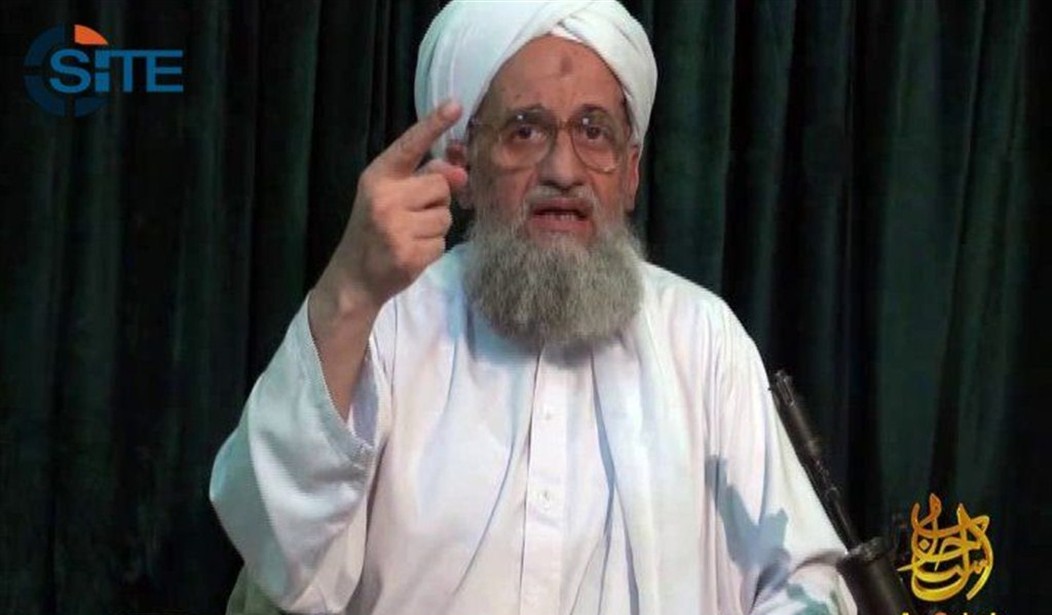Answer: Almost certainly not, but it shouldn’t have taken the strike on Ayman al-Zawahiri to prompt regret in the first place. Bill Roggio posed the question this morning after the leader of al-Qaeda got sliced and diced by a US missile in Kabul, where Sirajuddin Haqqani insisted AQ would never be back in February 2020. The New York Times happily ran that op-ed as “peace” talks moved forward toward an American withdrawal.
One has to wonder whether two successive administrations regret that op-ed, too:
2) "We are also aware of concerns about the potential of Afghanistan being used by disruptive groups to threaten regional and world security. But these concerns are inflated: Reports about foreign groups in Afghanistan are politically motivated exaggerations …"
— Bill Roggio (@billroggio) August 2, 2022
4) And yet, "reports about foreign groups in Afghanistan" were not "politically motivated exaggerations" and it was indeed "in the interest" of Sirajuddin Haqqani "to allow such groups to hijack our country." Zawahiri's presence in Kabul is proof of that.
— Bill Roggio (@billroggio) August 2, 2022
Exactly. What was Zawahiri doing in Kabul, anyway? We’ll get to that in a moment, but first let’s stick with the question for the NYT. Only a few months after this, the Times’ staff would erupt in indignation over the publication of an op-ed by a sitting US senator (Tom Cotton) arguing for the need to use troops to put down insurrections in major US cities, where violent demonstrators had seized territories to declare “autonomous zones” outside the jurisdiction of federal, state, and local governments. The declaration that this made the staff “unsafe” forced out editor James Bennet, who had green-lit a fairly mundane exercise in allowing high-ranking elected officials to explain their policy stands.
Did anyone — anyone — at the NYT publicly object and make the “unsafe” argument when it came to running an op-ed from a terror leader allied to the terror group that actually killed thousands of New Yorkers? The “deputy leader of the Taliban,” as the Times described Haqqani, was a high ranking official in an unelected tyranny that actively partnered with and sheltered AQ both before and after 9/11 — and after the other terrorist attacks on American interests quarterbacked by Zawahiri, too.
The answer then was no, and the answer to Bill’s question is undoubtedly “no” as well, despite the fact that Haqqani’s essay was pure propaganda, and easily identified as such.
That brings us to the other question: why was Zawahiri in Kabul? It seems very unlikely that he would have operated openly in the capital while the US remained and our allied government ran the city. Their writ didn’t consistently run outside of Kabul, but until July of last year they at least had a good grip on the major cities. Bill has some thoughts about that, too:
Zawahiri’s death is being hailed as a counterterrorism success, but that narrative masks the fact that Afghanistan has become a safe haven for top Al Qaeda leaders following the withdrawal from the country and the abandonment of the Afghan government.
That the 71-year-old Zawahiri was killed in Kabul – reportedly in a house owned by a top aide to senior Taliban leader Sirajuddin Haqqani – provided irrefutable evidence that Al Qaeda was operating in Afghanistan with the express permission, protection and support of the Taliban.
For further proof, shortly after the news of Zawahiri’s death broke on Monday, the Taliban released a statement “strongly” condemning the drone strike, saying it “violated” international principles and the Doha Agreement. …
Just weeks before Zawahiri’s demise, the United Nations stated that Al Qaeda’s “leadership reportedly plays an advisory role with the Taliban, and the groups remain close.” Zawahiri’s presence in Kabul’s posh Sherpur neighborhood, where an explosion was reported to have taken place on July 31, would have allowed him to be in close contact with top Taliban leaders.
Our withdrawal allowed AQ back to business as usual in Kabul, just as we warned it would during the negotiations in 2020 under Donald Trump and in Joe Biden’s craven and disastrous withdrawal in 2021. It apparently didn’t even take a year for Zawahiri to set up shop and rebuild the Taliban-AQ relationship, the same one that Haqqani tried to claim would never exist under Taliban leadership.
Getting Zawahiri was a real win, without doubt, but in the context of a much greater loss. Having AQ operate in partnership with the Taliban again sets our counterterrorism efforts back twenty years even if we still have enough intel in Kabul to target AQ leadership. Even that won’t last forever, though; we’re probably having to evacuate the intel sources connected to this strike, and reprisals may take out more sources and discourage others. Had we executed a withdrawal that left the US-allied government with the resources to defend itself, the exit might have prevented an AQ return to Kabul, and it certainly would have left us with a lot better intel on terror threats in Afghanistan. Zawahiri’s sloppiness doesn’t entirely cover the fact that the vacuum we left behind is making us much less safe than we were before Haqqani wrote that op-ed.









Join the conversation as a VIP Member